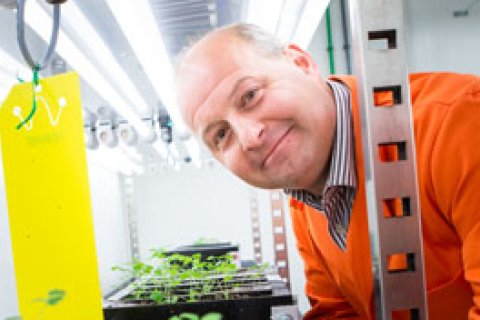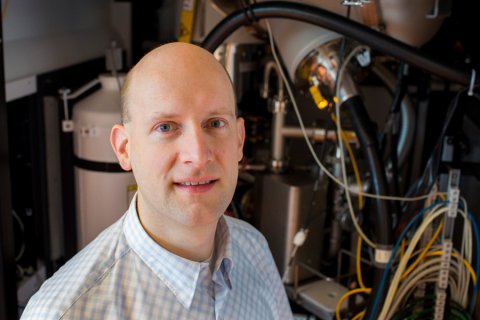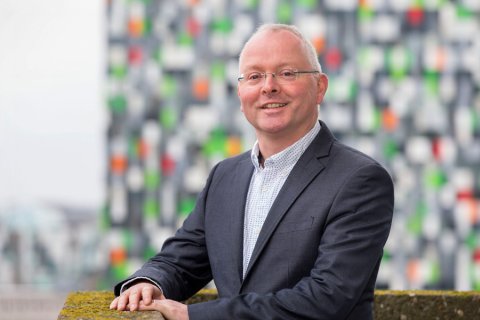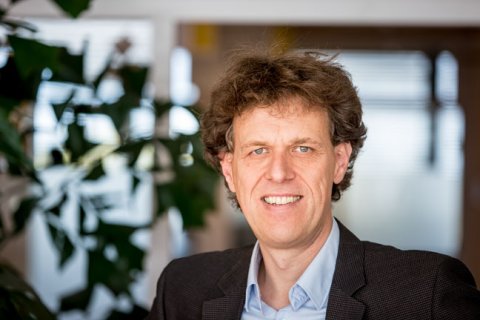Four grants for Faculty of Science from the National Research Facilities Roadmap
For Life Sciences, Nanomaterials, Future Food and Climate research
The Faculty of Science is involved in four projects from the NWO National Roadmap Large-Scale Scientific Infrastructure. As a result, the faculty will soon acquire unique research platforms for studying the relationship between genes and the desired characteristics of plants, receive the best electron microscope in Europe for materials research, will be able to expand the scientific limits of the proteomics research facility, and can develop the most advanced measurement techniques for local weather, climate and air quality.
The Netherlands Plant Eco-phenotyping Centre (NPEC)

- Main applicant: prof. Mark Aarts, Wageningen University
- Faculty of Science research leader: Prof. George Kowalchuk
- Total grant 11.3 M€, of which 5.6 M€ is for the UU Science Faculty
The NPEC will set up six unique experimental research platforms for plants in Utrecht and Wageningen. “Plants are essential for human life on earth. But the sustainable production of sufficient food for the world’s growing population, without depleting the soil, is one of the biggest challenges the coming generation will face. With the NPEC, we aim to accelerate the scientific breakthroughs that will be necessary to achieve that goal”, explains research leader Prof. George Kowalchuk. In Utrecht, the emphasis lies on research into ecology, the interaction between plants and microbes, and the interaction between plants and the environment. “When combined with our current research facilities, this will further reinforce the leading position of the Netherlands and Utrecht University in the experimental plant- and ecological sciences. This grant will enable us to continue to lead the way in achieving the sustainable agronomic solutions we will need in the future.”
Read more about the NPEC
Netherlands Electron Microscopy Infrastructure (NEMI)

- Main applicant: Prof. Judith Klumperman, UMC Utrecht
- Faculty of Science research leader: Marijn van Huis
- Total grant 17.3 M€, of which 4.1 M€ is for the UU Science Faculty
The grant for NEMI will bring a super-high-resolution electron microscope worth 5 million Euros to UU. This will allow researchers to zoom in to an unprecedented resolution - to the atomic level - to study new materials. “Researchers at the Debye Institute are constantly developing new nanomaterials with unique characteristics for advanced applications. So it is extremely important to be able to make them visible”, explains research leader Marijn van Huis. The microscope is unique in that in addition to the atomic structure, it can also display the chemical, optical, magnetic and electronic characteristics of the material, in either two or three dimensions. Utrecht University geoscientists will also use the microscope for their research. The NEMI grant also means that Utrecht’s Life Sciences researchers will be able to use the advanced cryo-electron microscopes in Leiden more often, in order to view proteins and DNA at near-atomic scale.
Netherlands X-omics Initiative

- Main applicant: Prof. Alain van Gool, Radboud University Nijmegen
- Faculty of Science research leader: Prof. Albert Heck
- Total grant 17.3 M€, of which 3.2 M€ is for the UU Science Faculty
Spinoza prize winner Prof. Albert Heck will lead the proteomics efforts in the X-omics Initiative. Proteomics is the large-scale study of all proteins and their biological function in different cells. “But nowadays it is equally, if not more, important that we will be able to integrate the different ‘omics’ - proteomics, genomics, metabolomics - together as well. That is where opportunities await to gain new insights that can lead to new applications in medicine”, according to Heck. The X-omics Initiative builds upon the expertise and experience gained under Heck’s leadership in the Netherlands Proteomics Center, and the follow-up programme Proteins@Work, which is also funded by the NWO Roadmap. Utrecht University (proteomics) and UMC Utrecht (proteomics and genomics) are large partners in the project, and Utrecht Life Sciences is furthermore involved through the Hubrecht Institute.
The Ruisdael Observatory for atmospheric science

- Main applicant: Prof. Herman Russchenberg, TU Delft
- Faculty of Science research leader: Prof. Thomas Röckmann
- Total grant: 18.2 M€, of which 1.9 M€ is for the UU Science Faculty
The Ruisdael Observatory will use four fixed meteorology stations, two mobile stations and an aircraft to measure the weather, greenhouse gases and air quality in the Netherlands. Thanks to this grant, the insights that these observations produce will be integrated so that the interplay between all of the processes can be better understood and calculated, explains Utrecht University research leader Prof. Thomas Röckmann. One of the goals of the study is to develop a method for measuring the carbon balance in the Randstad. “Considering the Paris climate accords, we should be able to determine it objectively”, according to Röckmann. The main challenges facing the researchers are the collection and interpretation of the measurement data. “The good thing is that the Ruisdael Observatory brings together all of the Dutch researchers in the field, and therefore all of the expertise available on the topic.”

